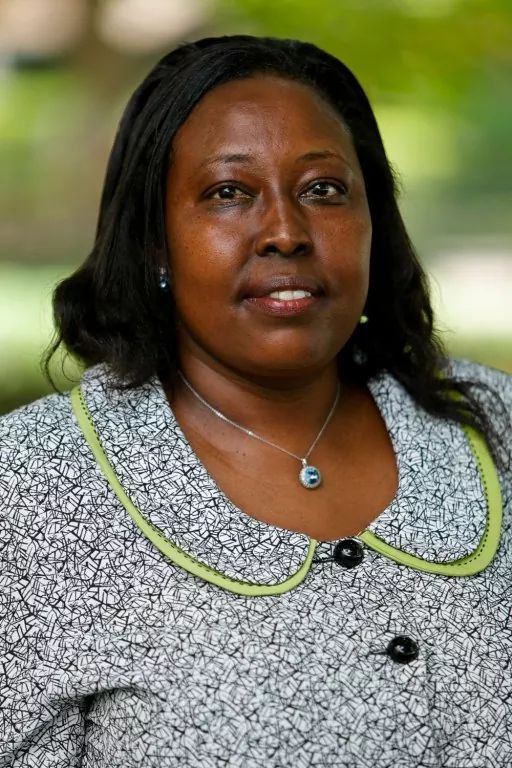Women in Policy: Promoting Education and Fighting Gender-Based Violence in Zambia and Kenya
To mark the occasion of International Women's Day, IPA presents the second of three blog posts this week interviewing female policymakers we've worked with in different countries around the world. They told us about their experiences working in government and promoting a culture of evidence-based policymaking within their institutions, how the COVID-19 pandemic changed their work, and what long-term impacts they hope to achieve in the sectors in which they work. See the first blog post here.
Dr. Damaris Parsitau, Founder and Director, Let Maasai Girls Learn, Kenya
Dr. Damaris Parsitau has dedicated her career to promoting equitable development for girls, women, and other vulnerable communities in her native Kenya. As head of Let Maasai Girls Learn (LMGL), Dr. Parsitau works to promote girls’ education within the Maasai community. The issue is deeply personal to Dr. Parsitau, and she also serves as a role model for the girls: she grew up within the Maasai community and overcame many structural barriers, eventually obtaining a PhD in Religion, Gender, and Public Life and becoming a professor. Dr. Parsitau also serves as a subject-matter expert on the Women’s Work, Entrepreneurship, and Skilling project in Kenya.
How have you worked to promote evidence-based policy in your work?

As an advocate for gender equality, I’ve learned over the years that if policies hope to be effective, and ultimately effect change, they need to be grounded in evidence. As a former Echidna Global Scholar at the Brookings Institution, I deepened my exposure to best practices for promoting evidence-based decision-making and improving outcomes for marginalized populations.
My time in Washington culminated with the incubation and official launch of Let Maasai Girls Learn (LMGL). Let Maasai Girls Learn ensures that our advocacy and policy priorities reflect research-backed insights and emerging consensus on education and gender equality, among other areas. I have authored a number of briefs and policy proposals for improving Maasai girls’ education, and my work has explored how assets of the Maasai people, such as traditional community leaders, can be engaged to promote girls’ education and empowerment. Educating girls is not just transformative for them, but also for their families and communities, and this is a guiding principle in my advocacy and policy work.
How has your work been affected during the pandemic?
During the pandemic, I’ve continued to push for ongoing research and analysis to support the government in its efforts to promote education and mitigate learning losses. Two key issues for me to ensure that there is more awareness of are gender-based violence and teenage pregnancy, issues that were challenges before in Kenya and have worsened since the start of COVID-19, likely in part from extensive school closures. In addition, women in Kenya have taken on more caregiving and domestic responsibilities during the pandemic, mirroring trends in many countries, and I firmly believe that Kenya's economic recovery from the pandemic needs to center women and promote female labor force participation, among other priorities.
Could you tell us more about the WWES project and your role?
In addition to my work with LMGL, I’m collaborating with IPA on the Women’s Work, Entrepreneurship, and Skilling project. The project works to improve and deepen the existing data and evidence on the impact of the COVID-19 pandemic on women and girls and provide evidence-based insights and policy recommendations to address gender inequalities in the context of COVID-19 policy response during the immediate crisis and extended recovery period.
I serve as a subject matter expert for the project. In this role, I recently conducted a systems mapping of organizations in Kenya working on these issues to strengthen the project’s research-to-policy goals. Even as an established actor in this space myself, there is so much value for me to be in an environment where I am able to constantly learn and expand my own knowledge of these issues. It’s also been great to form networks and alliances within government and civil society to better anticipate policy windows to promote this work.
I’m hopeful that evidence-based policymaking will continue to expand in Kenya, but much remains to be done. I’m proud to be working to promote this in my country.
Besnart Simunchembu Kangalu, Principal Planner, Ministry of General Education, Zambia
Besnart Simunchembu Kangalu serves as a Principal Planner within the Policy and Research Unit at the Ministry of General Education. In this role, she is responsible for convening high-level stakeholder meetings to define policy priorities within the education sector. She also monitors the implementation of various social and economic development policies as they relate to education in Zambia.
How did you get your start in the public sector? What inspired you to pursue this type of work?

I have been working within Zambia’s government since my mid-twenties and began as a Social and Economic Planner. This role has allowed me to transition between different government ministries over the course of my career, beginning with the Ministry of Finance, where I finetuned key skills in public financial management. I was fortunate to receive a scholarship to the University of Sussex in the UK, where I was able to broaden my understanding of public policy. As a female leader in the policy sphere in Zambia, I’m also passionate about inspiring other women to work in the public sector and serving as a role model.
What is your role at the Ministry of General Education, and how have you worked to instill a culture of evidence-based policymaking?
After my Master's, I transitioned to the Ministry of General Education, where I now serve as Principal Planner. In this capacity, one of my main responsibilities is coordinating and leading high-level policy dialogues, key convening events that help to shape the education development agenda with international donors and partners every five years. I also coordinate the annual Joint Sector Review, which is an annual event held with partners and education experts to review the performance of the Ministry in the previous year, to inform the Ministry’s planning processes. In 2020, as part of the establishment of an Embedded Lab with the Ministry, IPA supported us with planning the JSR meeting, developing research tools, training staff, analyzing data, and writing reports.
The Ministry and the education sector more broadly in Zambia are continually strengthening the use of data and evidence to inform policy priorities and assess the impacts of existing programs. My colleagues and I work to assess the implementation and progress of the joint strategy since we are at the nexus between research and policy. The Ministry aims to continue to prioritize data-driven decision-making, and I think it is key to institutionalize these processes through our everyday work as well as through more formal events like the Joint Sector Review.
How has your work evolved during the pandemic, and how have you overcome these challenges?
The COVID-19 pandemic, of course, challenged much of the established goals of the Ministry and we needed to have an agile response to mitigate learning losses. It has certainly been one of the biggest challenges of my career. The multi-faceted crisis encouraged the Ministry to try to counter the silos that exist between government bodies and approach our COVID-19 strategy by integrating cross-cutting issues into our planning (for example, health and nutrition, and the role these can play in educational development). Of course, while the response strategy needs to be comprehensive and try to anticipate challenges to the extent possible, there also needs to be sufficient flexibility to respond to issues as they arise. For example, gender-based violence has emerged as an issue in Zambia at the school level, so we are incorporating psychosocial resources into the crisis response processes.
During the pandemic, the Ministry has updated our Education Management Information System (EMIS) survey and review processes to capture anticipated learning losses from the pandemic and craft a data-driven response. We updated several of the questions and survey modules that are collected to include questions on school dropout, early pregnancy, loss of learning time, adoption of remote learning, and other indicators that provide insights for a targeted response. We’ve conducted three comprehensive surveys since the start of the pandemic, one of which focused on different modes of alternative education provision we implemented with IPA and another on continuity of learning after schools reopened. In addition, other surveys, such as RECOVR, have assisted us in continually improving our emergency response. I am confident that lessons learned from this experience will help to inform future strategies should there be future situations that require remote learning.












